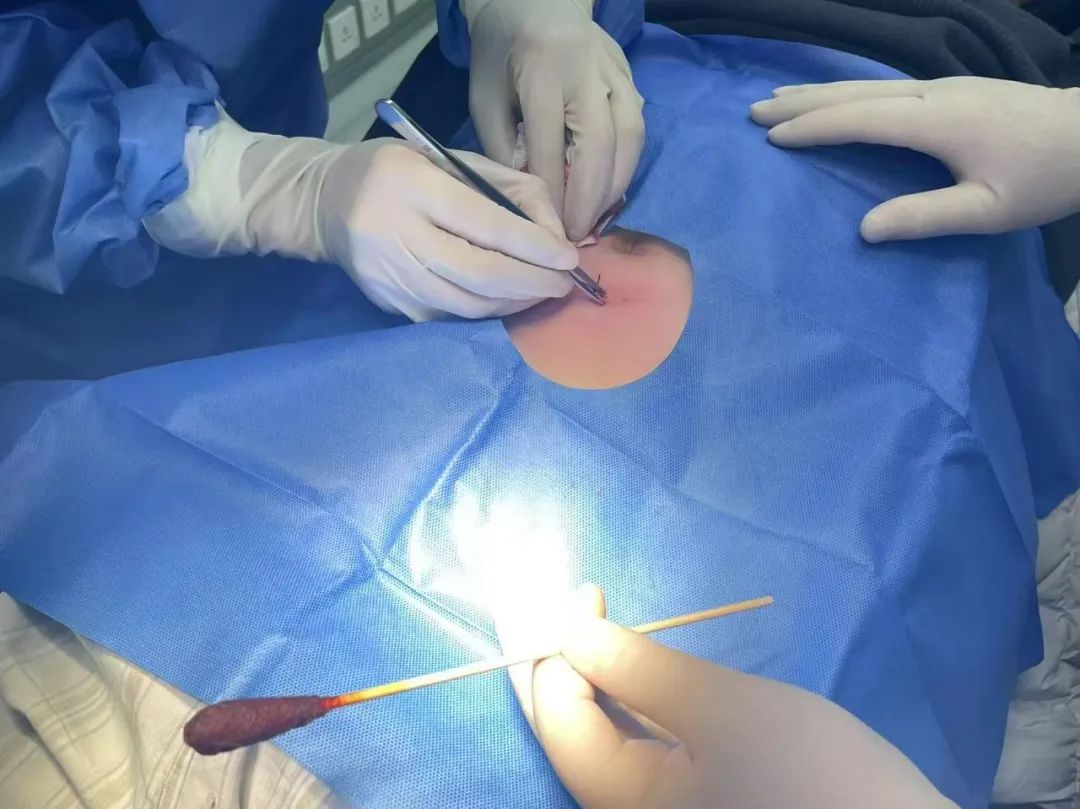 By Reporter Li Cong from the New Beijing News
By Reporter Li Cong from the New Beijing News
Editor 丨Chen Xiaoshu
Proofreader 丨Yang Li
►
This article has 5706 words and takes about 10 minutes to read.
Under the shadowless lamp, the scalpel steadily cuts open the skin 1 centimeter below Yuan Qizhi’s navel, about the width of a finger. Ten white pills, the size of soybeans, are pushed into the subcutaneous tissue in batches, five on each side, weighing a total of 1.5 grams.
The entire surgical process takes less than 20 minutes. Lying on the operating table, Yuan Qizhi, who has been drinking for over 30 years, feels a long-lost sense of relief. He thinks, maybe this time he can really break free from alcohol.
The implant known as the “alcohol abstinence chip,” which contains naltrexone hydrochloride, was initially developed for the treatment of opioid addiction. Now, it is used to block the reward mechanism in the brains of alcohol-dependent individuals.
The drug is slowly released into the body, circulating through the bloodstream and eventually crossing the blood-brain barrier, inhibiting the release of dopamine and other neurotransmitters associated with pleasure that are triggered by alcohol consumption. Theoretically, it will continue to be effective for the next 150 days—making drinking no longer pleasurable.
This medication for alcohol abstinence is considered “off-label use.” However, it may currently be the only medication available in the country for treating alcohol-dependent patients who relapse. Many alcoholics and their families view the “alcohol abstinence chip” as a new opportunity for rebirth.
However, doctors remind that the “alcohol abstinence chip” is just one part of the treatment process. It can block the reward mechanism and reduce the impulse to relapse, but it cannot address the psychological roots of addiction, such as anxiety, trauma, and interpersonal difficulties.
“Addiction is not a matter of weak will or morality,” multiple clinicians state. Alcohol addiction is a chronic relapsing brain disease that requires long-term management, similar to hypertension. Whether through medication or willpower, it cannot be resolved once and for all. In their view, addiction treatment requires the joint participation of multiple systems, including society, healthcare, and family, to truly support a person in breaking free from the shackles of alcohol.
Throughout the long years ahead, alcoholics will still have to face temptations repeatedly and rebuild their life order—until the end of their lives.
 〓 “The alcohol chip” surgery involves making a small incision of 1 to 2 centimeters on the skin below the patient’s navel to implant naltrexone hydrochloride under the skin. Photo provided by the interviewee
〓 “The alcohol chip” surgery involves making a small incision of 1 to 2 centimeters on the skin below the patient’s navel to implant naltrexone hydrochloride under the skin. Photo provided by the interviewee
A choice for an alcoholic
Five months have passed since the surgery, and Yuan Qizhi feels that the area where the drug was implanted in his abdomen is still a bit hard; he thinks the drug may still be releasing.
Yuan Qizhi, 56, has over thirty years of drinking experience. He is somewhat overweight, with thinning hair, and when he talks about his past drinking “absurdities,” there is a hint of teasing and self-deprecation in his laughter.
His most immediate feeling after the surgery is a decrease in appetite and a reduced desire for alcohol. He says that he used to be restless and always thought about going out for a drink; now he wakes up at eight every morning, prepares breakfast for his daughter, takes her out for exercise, and in his spare time, reads books and watches TV.
He feels that the anxiety driven by alcohol is gradually dissipating in his body.
The long history of drinking began after Yuan Qizhi graduated from high school when he became a mechanic. When he first arrived at the factory, the older workers would drink a little during meals, and it was inevitable to share drinks, which seemed to be a natural thing to do.
In 2001, during the restructuring of state-owned enterprises, he went to work in another city. He would drink a shot or two as soon as he woke up in the morning, which made him feel “alive.” During breaks at work, when it wasn’t busy, he would also take a few sips. He preferred high-proof liquor, saying that anything below 50 degrees was “not strong enough.” Alcohol became a comfort during work and gradually seeped into the cracks of daily life.
Time flowed like water, and the birth of his daughter brought joy to the family. However, starting at the age of six, the child frequently fell ill, suffering from hypoglycemia, pancreatitis, and eventually being diagnosed with schizophrenia. During those days when she lost control of her emotions, talked to herself, and couldn’t live normally, Yuan Qizhi broke down; he couldn’t understand why his daughter had to suffer these things and began to numb himself with alcohol.
“Casual drinking” turned into “heavy drinking.” One time at three in the morning, he ran several kilometers to a 24-hour gas station to buy alcohol; another time at a gathering, he drank himself nearly to alcohol poisoning, and his friends said he looked pale, taking three days to recover.
“How crazy was I back then? It was really absurd,” he now reflects on his past behavior.
Six years ago, Yuan Qizhi was first sent to a mandatory alcohol detox ward, where he had developed a habit of only drinking alcohol and not eating. His wife, Chen Lijun, tricked him into thinking they were going for a “health checkup.” He stayed in the detox ward for eight days, regularly took medication, received injections, participated in cultural activities, and even read in the library.
He once resolved to quit drinking, but a few months after being discharged, he relapsed. “It felt like a cat was scratching inside my heart.” Before he knew it, a few sips of alcohol had dragged him back into the abyss.
Excessive drinking also led to hallucinations and auditory hallucinations. Yuan Qizhi often felt he was in hell, seeing ghosts and deities. When he went for a checkup, the doctor told him these were mental issues caused by alcohol, and he followed the doctor’s advice to voluntarily check into the hospital for the second time. During his hospitalization, he received news of a friend’s sudden death in the morning; the friend could drink more than he could and could play a round of mahjong while drinking a pound of liquor.
Even so, after being discharged for the second time, he relapsed again. He secretly bought alcohol online, choosing brands he had never tried before, such as Northeast Baijiu and Qinghai barley wine, and hid them in mineral water bottles in the bathroom, but was caught by his wife on the spot. In a fit of anger, his wife installed an iron door, locking him in the house for three days, leaving only a crack in the door to deliver food.
Later, his wife signed him up for a documentary program on alcohol detox organized by the Second People’s Hospital of Hunan Province (Hunan Brain Hospital) and a local TV station, leading to his third hospitalization. The program aimed to recreate the entire process of detoxification for several deep alcoholics, allowing the audience to understand the dangers of excessive drinking. At the audition, he publicly sealed his alcohol bottle with tape, vowing to quit drinking for his family.
The program also offered participants a choice—free implantation of the “alcohol abstinence chip.” In December last year, Yuan Qizhi underwent the implantation surgery.
 〓 After being discharged for the second time, Yuan Qizhi relapsed, which was discovered by his wife. Photo provided by the interviewee
〓 After being discharged for the second time, Yuan Qizhi relapsed, which was discovered by his wife. Photo provided by the interviewee
Just discharged, he went to buy alcohol
From the perspective of clinical doctors, the transition from enjoying the pleasure of alcohol to losing control over it is not a simple linear process; it may take more than ten years or just a few months.
“Not being able to stop drinking” is the most typical symptom of alcohol dependence. Once drinking stops, physiological withdrawal symptoms such as insomnia, tremors, sweating, nausea, and rapid heartbeat may occur. In addition to “physical dependence,” there is also “psychological dependence.”
Li Ruihua, a doctor in the Addiction Medicine Department of Shandong Mental Health Center, explains that alcoholics drink uncontrollably, exhibiting compulsive drinking behavior. For example, drinking large amounts in a short time regardless of time and place; drinking for several consecutive days without eating or drinking; preferring to drink in the morning; often drinking alone; and hiding alcohol for secret consumption.
Li Ruihua mentions that inpatient treatment for alcohol dependence is divided into two stages: the first is the acute withdrawal phase, where the patient’s physiological dependence on alcohol is controlled. Doctors often need to determine a medication replacement plan based on the patient’s drinking history and withdrawal symptoms to alleviate withdrawal reactions. The second is the rehabilitation phase, which may include group psychotherapy, individual psychological counseling and therapy, and virtual reality-based desensitization therapy. After discharge, patients also have a phase of returning to society for outpatient rehabilitation.
“It is dangerous for long-term alcohol-dependent individuals to quit drinking on their own,” Li Ruihua states. The blood alcohol concentration of alcohol-dependent patients needs to be maintained at a certain level to keep the brain functioning normally. If they suddenly stop drinking, it may trigger severe withdrawal symptoms, even leading to delirium tremens—a state of physical tremors and brain dysfunction caused by acute alcohol withdrawal, which can even lead to sudden death in severe cases. Therefore, alcohol-dependent patients mostly need to be hospitalized in medical institutions for detoxification.
After the acute withdrawal phase ends, patients enter the rehabilitation phase, where the lack of medication is a common issue faced by addiction specialists. Patients often leave the hospital only to go buy alcohol again, leading to the “revolving door effect.”
Zhou Xuhui, the director of the Addiction Medicine Center at the Second People’s Hospital of Hunan Province (Hunan Brain Hospital), has been engaged in addiction treatment since 2008. She currently serves as the president of the Alcohol-Related Disorders Branch of the China Association for Drug Abuse Prevention and Control. In the past, people had a limited understanding of alcohol dependence, often viewing drinking as a hobby, resulting in a low treatment rate for alcohol dependence.
Even when patients seek help from doctors after relapsing, Zhou Xuhui finds that she cannot completely cure them. When patients return after relapsing, “patients feel very frustrated, families are angry, thinking that money was wasted, and doctors feel confused.”
In 2014, she participated in writing the first “Guidelines for the Treatment of Alcohol-Related Disorders” in China. During her research, she found that the FDA had approved various treatment medications, including naltrexone hydrochloride. However, at that time, not only was the long-acting injection of naltrexone hydrochloride unavailable in China, but even the tablet form was rare.
Initially, in China, the naltrexone implant was developed for opioid-dependent individuals after detoxification to prevent relapse. Subsequently, the drug was granted “breakthrough therapy designation” by the National Medical Products Administration (NMPA) and was exempted from phase III clinical trials, with approval for formal marketing expected in June 2024.
However, the use of this drug for alcohol abstinence is considered “off-label use.”
In 2023, to expand the indication of naltrexone to include the treatment of alcohol dependence, phase II clinical trials were conducted in multiple medical institutions across the country, enrolling 210 patients with moderate to severe alcohol dependence, aiming to evaluate the efficacy and safety of naltrexone implants in treating alcohol use disorder.
The Second People’s Hospital of Hunan Province (Hunan Brain Hospital) and Shandong Mental Health Center participated in this study.
Zhou Xuhui recalls that one of the participants in the clinical trial was an old patient from Shandong. He had previously been hospitalized in her department over a dozen times, spending about twenty days a month in the hospital. Before each discharge, he would plead, “Can you not discharge me? I will drink as soon as I go out.”
After the implantation of naltrexone, this patient reported during follow-up, “I don’t know what happened, but this time I really don’t want to drink; just thinking about alcohol makes me nauseous.”
However, Zhou Xuhui also mentioned that this patient relapsed a year later. “But it wasn’t as severe as before.” He began to have the energy to do other things and no longer trapped himself in the dilemma of “should I drink, can I drink, will I be discovered?”
Zhou Xuhui believes that for patients who have been abstinent for over a year, even if they relapse, as long as they take their mental health seriously and are willing to seek treatment, it does not affect their quality of life and health, they can be considered to have improved.
 〓 The department where Zhou Xuhui works has been holding a party for hospitalized patients during the New Year for 16 years. Photo provided by the interviewee
〓 The department where Zhou Xuhui works has been holding a party for hospitalized patients during the New Year for 16 years. Photo provided by the interviewee
The collapse of the family
The impact of alcohol dependence is never just an individual matter.
Zhou Xuhui is accustomed to the occasional disputes that arise in the outpatient clinic, often occurring between patients and their families. “An alcoholic can turn a family upside down.”
The long-term effects of alcohol can cause patients to “change their personality,” with some patients exhibiting severe jealousy delusions. Zhou Xuhui mentions that some patients suspect their spouses of infidelity, making baseless accusations, and even exhibiting violent tendencies. These psychological symptoms often accompany addiction but are misinterpreted as “bad temper” or “lack of self-control.”
“Some patients use drinking as a coping mechanism,” Li Ruihua says. Many of the patients she sees have obvious emotional issues: anxiety, depression, post-traumatic stress disorder; alcohol becomes the most convenient means of self-numbing, an escape from real problems, making them feel that when they drink, they don’t have to think about anything.
Each relapse is not only a further destruction of one’s body and brain but also a blow to the family.
To care for her alcoholic husband, Wang Lu changed to a work-from-home job at the beginning of this year. Her husband has a 15-year history of drinking; initially, he only drank a couple of shots occasionally, but in recent years, he would get drunk every weekend, taking leave from half a day to a week.
Previously, when she was at work, she worried that her husband would use his phone to buy alcohol, so she would confiscate his phone. But she also worried about the danger of him drinking alone at home. In her eyes, her husband is kind, honest, and responsible when sober. Even though he is not sociable and does not like going out, he would accompany their child to read—this made her believe that as long as she tried hard, the family could still return to normal.
She searched online for various alcohol cessation programs and came across the Alcoholics Anonymous (AA) association, as well as reports on the “alcohol abstinence chip.”
Wang Lu persuaded her husband to attend an AA meeting, which was held in a massage shop in an old community. The shop owner was a former alcoholic who successfully quit drinking for four years after joining AA. She remembers that there were four alcoholics and one family member at that meeting, and one 22-year-old young man left a deep impression on her; he traveled six hours from another city to attend, and after being admitted to the ICU due to excessive drinking and receiving a critical condition notice, he finally decided to quit drinking, and he has maintained sobriety for over a year now.
AA provided Wang Lu with significant psychological support, becoming a space for her to express her feelings. Some mentioned that the family members of alcoholics suffer even more, as for alcoholics, drinking is a joyful experience, while for their families, it is a source of pain. She also learned that many people are in situations similar to her husband’s, or even worse.
However, her husband only attended one meeting, believing it was a “gathering of alcoholics” and did not want to “go to meetings every day.” He firmly believes that quitting drinking can only rely on himself. Wang Lu feels that this is her husband’s subconscious resistance to acknowledging that “he is a patient.”
Over time, Wang Lu developed severe insomnia and began to feel confused and self-doubting. “I resent him in my heart, but I understand him.” Wang Lu has always been reluctant to give up; she has been paying attention to the “alcohol abstinence chip” for some time. “A dead horse is better than a live horse.” She has contacted several families of patients who underwent the surgery, and the results varied; some did not relapse, while others relapsed after surgery, and worse, some drank even more because they felt no effect after implantation. But she still wanted to give it a try.
In March of this year, Wang Lu’s husband underwent the implantation of naltrexone hydrochloride. Her immediate feeling is that her husband’s emotions have stabilized significantly, and he plays with their child, and so far, he has not relapsed.
However, Wang Lu understands that relying solely on surgery is far from enough; the support and psychological assistance from family members are equally important. She says, “Technology can provide tools, but change still requires our joint persistence.”
 〓 The “alcohol abstinence chip” naltrexone implant is indicated for preventing relapse in patients with opioid dependence after detoxification. Photo provided by the interviewee
〓 The “alcohol abstinence chip” naltrexone implant is indicated for preventing relapse in patients with opioid dependence after detoxification. Photo provided by the interviewee
The craving for alcohol is “a disease”
“Can this disease be cured?” “After implantation, will there be no relapse?” “If it cannot guarantee no relapse, why spend this money?” The questions from family members reveal an expectation for a “complete solution.”
“Ideally, complete abstinence is the goal, but it is really difficult to quantify,” Zhou Xuhui explains. The evaluation of the effectiveness of alcohol cessation treatment usually includes multiple indicators, such as abstinence rates, drinking days, improvement in social functioning, and enhancement of quality of life. “Just like quitting smoking, there is also the intermediate state of ‘reducing smoking amount.'”
As for the effectiveness of the “alcohol abstinence chip,” there is currently no long-term clinical data available in the country.
On November 9, 2024, at the data release conference for the phase II clinical trial of the drug for preventing relapse in alcohol-dependent patients, Professor Hao Wei, the project leader from the Mental Health Research Institute of Central South University, mentioned that compared to the control group, patients using naltrexone implants had significantly reduced days of heavy drinking and total alcohol consumption.
Internationally, the FDA approved naltrexone for preventing relapse in alcohol dependence in 1994. The Journal of the American Medical Association published a study on drug treatment for alcohol use disorder in 2023, which included 118 clinical trials covering nearly 20,000 participants. Injectable naltrexone is more suitable for short-term control of drinking behavior, averaging helping patients reduce about five days of drinking days during a 30-day treatment period.
Currently, although the phase III clinical trial of the drug for preventing relapse in alcohol-dependent patients has not yet started, many hospitals have already begun related surgeries.
Not all alcohol-dependent patients are eligible for surgery. Patients undergoing this surgery need to be diagnosed by a professional doctor as having moderate to severe alcohol dependence, with a strong desire to quit drinking, and preoperative assessments must meet the implantation criteria, such as not having severe liver dysfunction and no recent history of opioid use.
Sometimes, when faced with questions from patients’ families, Zhou Xuhui can only respond in a nearly philosophical way—just as everyone ultimately faces death, should we not strive to live? Treatment is not just about “breaking the addiction”; it also includes facing the shame of relapse, accepting failure, and repairing relationships that have been torn apart.
In addition to medication treatment, it also involves how to view the complex phenomenon of “addiction” and how to understand and construct a treatment system for alcohol dependence.
Just as many addicts initially find it hard to believe that their craving for alcohol is “a disease.”
Wang Lu’s husband often says when sober, “I can’t drink anymore; I can’t drink anymore; if I drink again, I won’t have a life.” He has also tried to replace drinking with snacks and non-alcoholic beverages. But when the real craving for alcohol hits, these methods become useless; he would hide in the basement to drink or borrow alcohol from others, and after sobering up, he would immediately go pay back the debt. He repeatedly relapsed and then regretted it, attributing his failures to a lack of willpower.
Wang Lu does not share this view. She has consulted multiple psychiatrists, and the doctors generally believe that alcoholism is an addictive disease, and quitting drinking is as difficult as quitting drugs. This disease, like diabetes and hypertension, cannot be controlled solely by willpower.
This is a scientific understanding. For those who do not understand alcohol dependence, an alcoholic is merely an adult who lacks self-control, is emotionally unstable, and has failed in life and work.
Many doctors have mentioned that people’s understanding of “addiction” is also changing. Initially, “addiction” was seen as a moral issue stemming from personal character flaws, such as a lack of willpower. However, with the advancement of scientific research, from a medical and biological perspective, “addiction” is defined as a chronic complex brain disease.
Shifting from “controlling him to stop drinking” to “accompanying him to face it” is the beginning of understanding this chronic disease.
Doctors have observed that in recent years, alcohol dependence has shown a trend of becoming younger. Previously, most patients in outpatient clinics were elderly, but now there are increasingly more young people, such as college students, white-collar workers, and even young professionals.
Zhou Xuhui states that this change reflects both the effectiveness of public education on “alcohol dependence as a disease” and indicates that stress has become a potential trigger; for some, drinking is not about seeking happiness but about wanting to feel “less miserable.”
The prevalence of alcohol also makes it harder for alcoholics to quit. Temptations come from everywhere: the wine glasses they have drunk from at the dining table, the dazzling array of alcoholic beverages in stores, and the alcohol advertisements that are everywhere on screens.
“Addiction diseases are the most prone to relapse. If treatment is not adhered to, the relapse rate for alcohol dependence is 60% to 80%, while the relapse rate for heroin dependence is 97%, and the relapse rate for tobacco dependence is 95%,” said Sun Hongqiang, deputy director of the Sixth Hospital of Peking University.
In other words, the “alcohol abstinence chip” can help “hit the brakes,” but the steering wheel is still in the patient’s hands.
For Wang Lu, she hopes that the effect of this chip can last longer. This may not be the end of victory; she does not know what will happen in the future, but at least her current days are much better than before.
(Wang Lu is a pseudonym at the request of the interviewee)
Little Fox reminds: Due to changes in public account rules, in order for our articles to be sent to you in a timely manner, please set Little Fox’s public account as a star, so we can work together to safeguard the ability to think independently.

 — Let’s Talk —
— Let’s Talk —
Do you know anyone with a drinking addiction?
– The content only represents the author’s views and does not represent the position of Sohu stance -- Previous Recommendations -▼



Explaining the significance of news with a unique perspective, guarding the ability to think independently with the most genuine warmth and attitude. Let’s have a collision of ideas together.